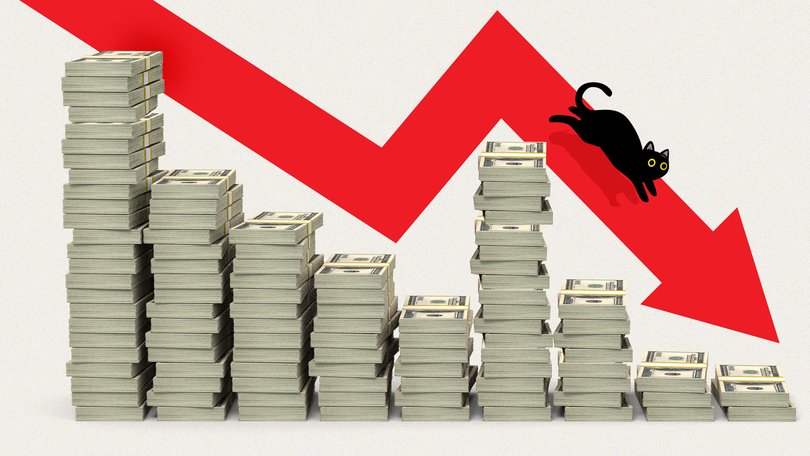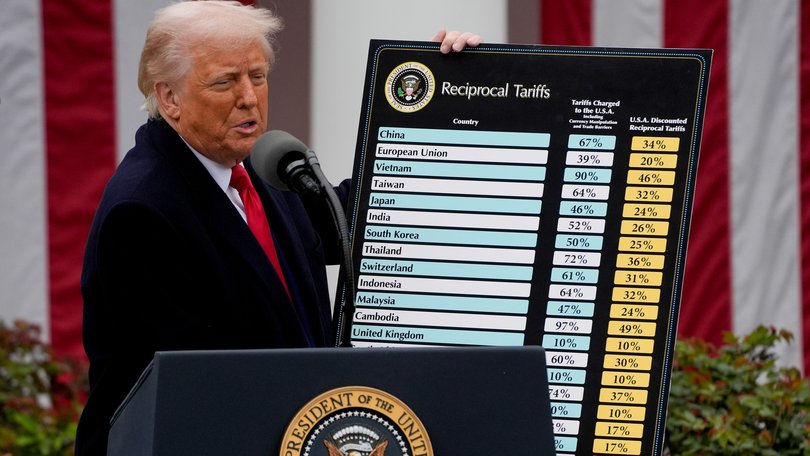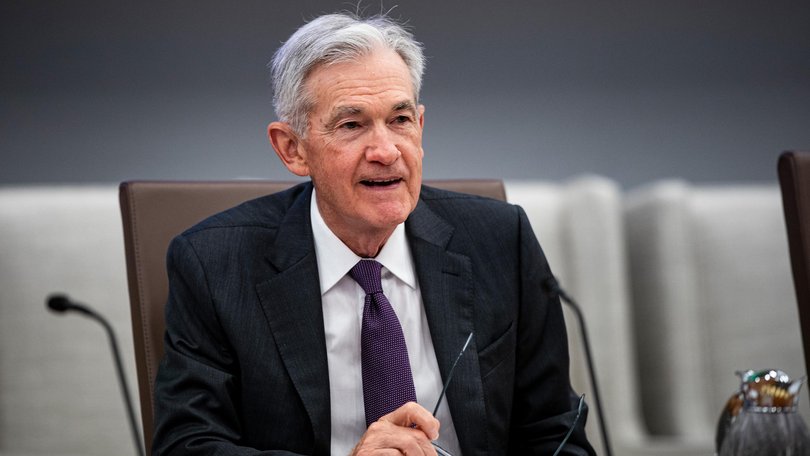JACKSON HEWETT: Are bouncing markets becoming too complacent on impact of Donald Trump’s tariffs?
JACKSON HEWETT: The Dead Cat Bounce saying feels very appropriate right now

There’s an old saying in the share trading game. Don’t get caught in a dead cat bounce.
The idea is that after any big selloff, a mini bounce back draws in the inexperienced investor who then watches aghast as the share continues its downward trajectory.
Trump’s Liberation Day tariffs gave investors an almighty scare. The S&P 500 dropped 12 per cent in a week, the NASDAQ 13 per cent, and the broader Russell 2000 14 per cent.
Sign up to The Nightly's newsletters.
Get the first look at the digital newspaper, curated daily stories and breaking headlines delivered to your inbox.
By continuing you agree to our Terms and Privacy Policy.Our market fell a relatively muted 5 per cent.
But the initial panic that followed the tariff shock has not only disippated, it has been obliterated.
US shares are now are all higher than they were at the start of the year when the US market was on a tear, and as much as 20 per cent higher than their post Liberation Day lows.
“If what we’ve seen since April is a dead cat bounce, it’s been a pretty rubbery cat,” Tim Toohey, Yarra Capital’s head of macro strategy, and the former longtime head of macro strategy at Goldman Sachs, told clients in a recent webinar.
“But the cat may start to lose altitude pretty soon.”
Investors have been shovelling cash into the US sharemarket chasing the so-called TACO trade. That is “Trump always chickens out” when it comes to implementing his radical policies.
But with the latest volley of letters of demand, shouldn’t investors be more worried Trump is actually going to go through with the largest tariff imposition in almost 100 years?
AMP’s chief economist, one of Australia’s most experienced market watchers thinks the markets absorbed the initial shock and have become overly sanguine in the aftermath.
“There’s this old analogy about a boiling frog, that if you throw a frog in the boiling water, it jumps out. Maybe that’s what we saw back on Liberation Day,” Dr Oliver told The Nightly.
“You wonder whether the temperature is gradually rising in the water with tariffs trending back up again, and whether that will adversely affects share markets.”
Donald Trump is teeing off on tariff numbers like he’s at the driving range, with 200 per cent on pharmaceuticals, 50 per cent on copper, 50 per cent on Brazil for being mean to its former president.
He’s increasingly acting like a king, abusing the International Emergency Economic Powers Act at will. So far, neither Cabinet, Congress, nor the Supreme Court has provided the checks and balances that underpin American exceptionalism.
The markets — bond or equity — were supposed to be the one arbiter he would listen to. They seem to be wholly addicted to business as usual.
“Markets are just looking at the immediate impact, and fixating on the mainly positive economic data, such as unemployment in the US, and not reacting to the extent they should,” said Dr Prudence Gordon, executive director of the Australian Centre for International Trade and Investment and a former trade diplomat.
“My concern is business is going to reward Trump, and this is going to end in tears and a global economic downturn.”
Warning signs brewing
With 22 days until the next deadline of 1 August, a lot will have to go right if the market is to justify its record highs.
Already a key warning sign — the equity risk premium — is flashing.
That metric is the extra return investors expect from owning shares instead of safer government bonds, compensating them for taking on higher risk.
The market has been bid so high that earnings from holding shares are the same as returns from bonds. In the post GFC period, Dr Oliver said the returns from shares were significantly higher.

“Valuations are a little bit stretched, we’ve got markets at record highs, and the economic impact is yet to be fully seen,” he said.
“That leaves markets more vulnerable to bad news.”
Those high valuations require earnings to remain strong. But the outlook for one of Australia’s most successful consumer brands, Breville, suggests that is improbable.
With new duties of up to 36 per cent on goods from key manufacturing hubs like China, Indonesia, Cambodia, and Vietnam, Citi has cut its profit forecasts by 12 per cent, citing weaker margins and higher production costs.
The stock is currently trading on an eye watering multiple of 32.5 times earnings (the long term average is between 20 and 25), and Citi has reduced its target price by 16 per cent, “reflecting earnings changes and lower premiums.”
So far the current tariffs seem to have been partly absorbed and partly passed through, and Dr Oliver said the upcoming US earnings season could see the message hit home.
“If you’re absorbing (tariff costs) in margins, then we don’t get the normal upside surprise on US company profits . . . That could be a catalyst (for a selloff),” Dr Oliver said.
He thinks that could mean a correction of between 10 and 15 per cent.
Another catalyst might be how international investors treat the looming rollover in US government debt.
$US10 trillion ($15t) worth of borrowing via government bonds — known as Treasuries — expire in 2025/26. Ordinarily that would be a rubber-stamp process for international investors. But with US deficits set to soar following the more than $US3t in tax cuts following the Trump administration’s One Big Beautiful Bill, and wariness from once-large Treasury buyers like China, that picture looks more complicated.
“It’s pretty clear that the bond market is nervous on the sustainability of that debt,” Mr Toohey said.
“US sovereign Credit Default Swaps (a type of insurance against a government defaulting on its debt) are about the same levels as where we got to at the worst of the European sovereign debt crisis (in the early 2010s).”
A bond-buying strike by nervous investors would force yields on those bonds to spike, and flow through to higher interest rates. That would put further brakes on businesses and households, just as tariffs start to bite.
It’s one of the reasons Trump has been so aggressively targeting US Federal Reserve Chair Jerome Powell on interest rates. He wants Powell to reduce rates to both keep interest payments on US Government debt down, but also to backstop the economy if tariffs start to impact American consumers.

Mr Powell will definitely be replaced when his term ends mid next year. But if an emboldened President acts unilaterally to fire him, he will further erode the confidence foreign investors have in US institutions.
Investors are already hedging their bets on American exceptionalism, pushing safe-haven gold to a record high, while the US dollar has fallen as foreign investors stay away from US assets.
Bitcoin has also soared to a record high of almost $A170,000 as traders imagine a world where the US dollar no longer reigns supreme.
Currently everything seems priced to perfection. The question for investors isn’t whether something will go wrong. It’s whether they’ll recognise it the moment before the bounce runs out of rubber.

